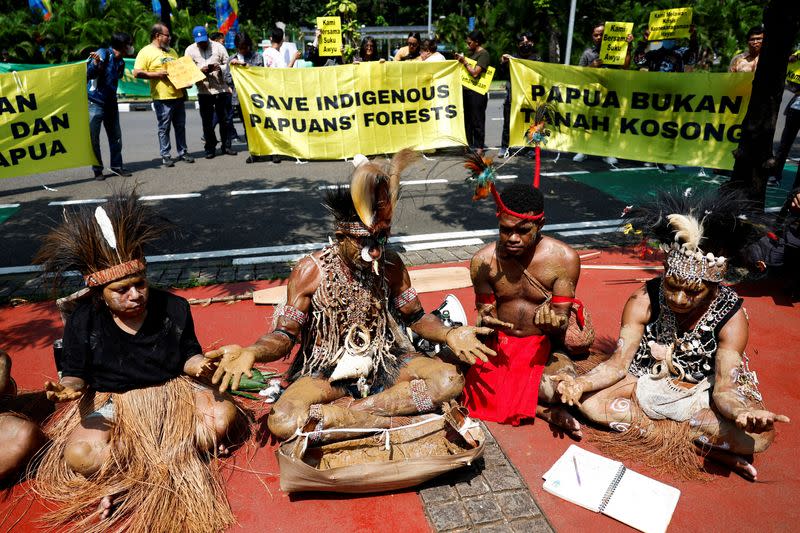Papuan tribe, palm oil firms battle for land rights in Indonesian top court

By Kate Lamb and Bernadette Christina
JAKARTA (Reuters) - In a jungled corner of Indonesia's Papua, the Awyu tribe await a Supreme Court verdict that will determine whether thousands of hectares of rainforest will be cleared for a vast palm oil concession to be planted atop the graves of their ancestors.
"Birds of paradise, cassowaries... sacred places, and the paths of our ancestors are there," said Awyu man, Hendrikus 'Franky' Woro. "If the graves of our ancestors are removed, we will be committing a sin against them."
At stake in three cases being decided by the court is the fate of nearly 115,000 hectares of forest, part of the single largest, collective palm oil bloc in the world's largest palm oil exporter, Indonesia.
Located in Papua's Boven Digoel, the 270,000-hectare bloc is divided into seven concessions, three of which are now legally contested.
The court decision, which lawyers expect this month, will set an important precedent in a country that has pledged to both protect a $30 billion export industry, and improve governance amid allegations of deforestation and human rights violations.
"This is the first time a clear indigenous-climate nexus argument has been presented in this type of case," said Difa Shafira, from conservation group the Indonesian Center for Environmental Law, referring to calculations that clearing the land would emit approximately 23 million tonnes of environmentally harmful carbon dioxide.
Representing the Awyu people's Woro clan, which claims customary ownership of the land, Franky has been fighting against a concession granted to PT Indo Asiana Lestari (IAL) on 36,000 hectares, an area more than half the size of Jakarta.
A case filed at lower courts in 2023 was rejected and is now at the final stage in the Supreme Court.
In a statement IAL said it had obtained all the permits legally required and had reached agreements with 12 indigenous clans in the area.
"The Woro clan is acting on behalf of individuals and does not represent the clans who provide their support to the company," it said.
According to internet archive, the Wayback Machine, IAL was listed as being owned by Malaysia's Whole Asia Group. The website was taken down in June and IAL did not immediately respond to questions about its ownership.
Alongside the IAL case, other Awyu members are also seeking to revoke the permits of PT Kartika Cipta Pratama and PT Megakarya Jaya Raya, two other palm oil companies granted concessions within the bloc.
Lawyer Eddy Marek Leks, who represents those two firms, said the companies had obtained permits in accordance with all laws.
The court has not provided the date of the verdict, but is expected to rule on all cases concurrently.
DEFORESTATION
Home to a third of the world's rainforest, Indonesia introduced a moratorium on forest clearance for activities such as palm oil and logging in 2011.
The policy has been extended, but some forests continue to cleared due to a lack of oversight, regulatory cohesion and land classification, including for palm oil.
Used in everything from chocolate, soap, fuel and lipstick, palm oil is the world's most widely used vegetable oil, with nearly 60% originating from Indonesia.
The ubiquitous oil's link to deforestation was a driving factor behind the European Union's new regulation banning the import of products linked to forest clearance.
The forest area Franky is seeking to protect was classified by the environment ministry in 2012 as an "other use area", meaning it can be used for palm oil.
But there now seems to be a change in official tune.
Questioned in parliament last week, environment minister Siti Nurbaya Bakar said primary forest could not be cleared, and the government was currently re-classifying intact primary forest as customary forest, or forest designated for the indigenous people of the area.
Travelling to Jakarta with a symbolic piece of land, Franky says the decision will dictate his tribe's future.
"We can live without mining, without palm oil," he said, "But if we don't have customary forests, we can't live."
(Editing by Miral Fahmy)
